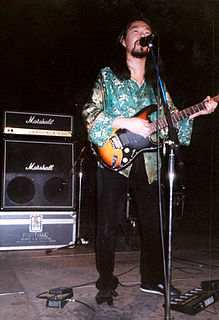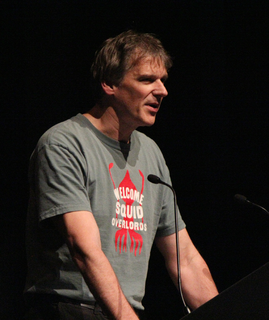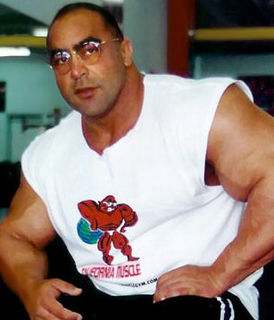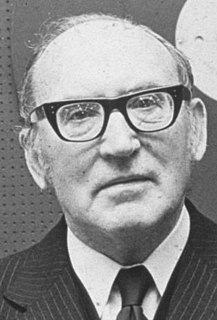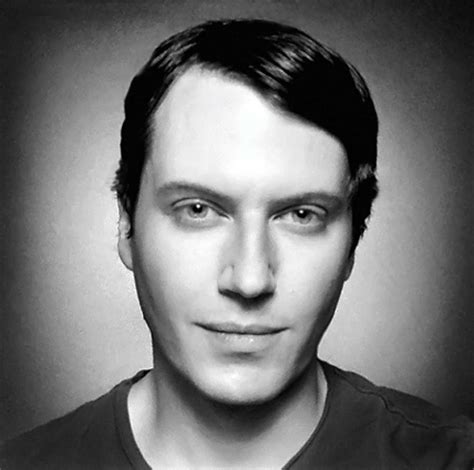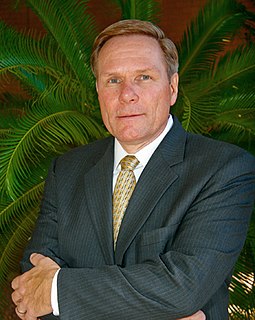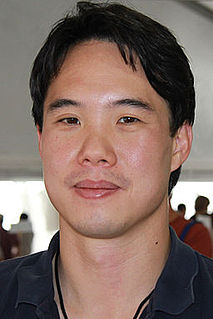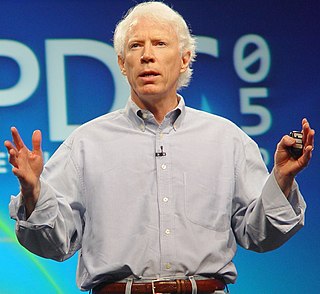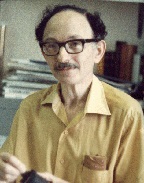Top 1200 Machines Quotes & Sayings - Page 2
Explore popular Machines quotes.
Last updated on April 14, 2025.
All of us in a bipartisan manner went out of our way to explain to the voters how our election systems are secure, the fact that voting systems are not connected to the Internet - not the machines that we use to mark ballots, not the machines that we use to count ballots, the fact that our election counting procedures are very transparent.
As a blind voter, I'm strongly opposed to the paperless e-voting machines that the NFB is trying to force onto us. I want a voting system that is accessible to as many voters as possible and that also produces an audit trail. The paperless machines are simply the wrong approach, and I support the County's efforts to try to find a better way.
Labor produces marvels for the rich but it produces deprivation for the worker. It produces palaces, but hovels for the worker. It produces beauty, but deformity for the worker. It replaces labor by machines, but it throws one section of the workers back to barbaric labor, and it turns the remainder into machines.
We have the power to defy the selfish genes of our birth and, if necessary, the selfish memes of our indoctrination. We can even discuss ways of deliberately cultivating and nurturing pure, disinterested altruism - something that has no place in nature, something that has never existed before in the whole history of the world. We are built as gene machines and cultured as meme machines, but we have the power to turn against our creators. We, alone on earth, can rebel against the tyranny of the selfish replicators.
We are too much in the machine world today. Even here in Tuva we've got every year more and more cars and other technologies, and of course it brings more pollution to our air, to nature. And I think the idea of the Kraftwerk song is people should not be very much mechanized or to be a machine in the world of machines. The idea is to try to find a golden middle between the world of nature and the world of machines.
The most precise work is generally done by hand, with hand tools. Some people rely on machines for their precision, and my way of working is backwards. I rely on the machines for doing the gross stock removal and then, when it comes to the final refinements and fitting of joints and things, making things work together, I rely more on sharp-edged tools that I push by hand.
For the moment, machines able to 'think' in anything approaching a human sense remain science-fiction. How we should prepare for their potential emergence, however, is a deeply unsettling question - not least because intelligent machines seem considerably more achievable than any consensus around their programming or consequences.
Anything that we know how we do, machines will do better. Now, the key element of this phrase is, "We know how we do it." Because we do many things without knowing exactly how we do them. So this is the area where machines are vulnerable, because it still has to learn from some kind of experience. It needs something - at least the rules of the game. You have to bring in something that will help the machine to start learning. It's like square one. If there's nothing there, if you can't explain it, that's a problem.
Surely, if we take on thinking partners - or, at the least, thinking servants - in the form of machines, we will be more comfortable with them, and will relate to them more easily, if they are shaped like humans. It will be easier to be friends with human-shaped robots than with specialized machines of unrecognizable shape. And I sometimes think that, in the desperate straits of humanity today, we would be grateful to have nonhuman friends, even if they are only the friends we build ourselves.
Each new machine or technique, in a sense, changes all existing machines and techniques, by permitting us to put them together into new combinations. The number of possible combinations rises exponentially as the number of new machines or techniques rises arithmetically. Indeed, each new combination may, itself, be regarded as a new super-machine.
I turn on the machines and start to think about ideas and take it from there, it usually begins if it's a beat, a track creating a beat/beats and then the bass-line/lines, then comes the sounds--drones, atmospherics etc, then the edits of various sounds I created and keep going till I feel I have enough sounds ideas to start working and building a track. I have many banks of sounds that we hear that can be manipulated in the machines.
I don't have a favorite body part nor do I have a favorite exercise. Everyone who is honest prefers machines over free-weights, because machines are more convenient and cause less muscle pain and require less concentration and are generally less dangerous. BUT, if you like to have real gains you have to train hard and heavy, and you have to chose always the LEAST favorite exercises which actually give you the best possible results. So go for the least favorite exercises, the free weights... and go for the muscle pain!
Machines already are much smarter than us at so many things. I mean, try to multiply two 10-digit numbers with each other or, you know, sift through a thousand documents. So there's lots of things that machines are better at including in mental task than us. There's many more that they're not as good at, but the direction is pretty obvious and the progress is clear.
Although we will hate and fight the machines, we will be supplanted anyway, and rightly so, for the intelligent machines to which we will give birth may, better than we, carry on the striving toward the goal of understanding and using the Universe, climbing to heights we ourselves could never aspire to.
The development of artificial intelligence may well imply that man will relinquish his intellectual supremacy in favor of thinking machines. With oceans of time available for future innovation, there seems to be no reason why machines cannot achieve and surpass anything of which the human brain is capable.
The artificial intelligence approach may not be altogether the right one to make to the problem of designing automatic assembly devices. Animals and machines are constructed from entirely different materials and on quite different principles. When engineers have tried to draw inspiration from a study of the way animals work they have usually been misled; the history of early attempts to construct flying machines with flapping wings illustrates this very clearly.
Things that are so hard for people, like playing championship-level Go and poker, have turned out to be relatively easy for the machines. Yet at the same time, the things that are easiest for a person - like making sense of what they see in front of them, speaking in their mother tongue - the machines really struggle with.
We do know that we can set certain algorithms for machines to do certain things - now that may be a simple task. A factory robot that moves one object from here to there. That's a very simple top-down solution. But when we start creating machines that learn for themselves, that is a whole new area that we've never been in before.
If you search the scientific literature on evolution, and if you focus your search on the question of how molecular machines - the basis of life - developed, you find an eerie and complete silence. The complexity of life's foundation has paralyzed science's attempt to account for it; molecular machines raise an as-yet-impenetrable barrier to Darwinism's universal reach.
Although humans today remain more capable than machines for many tasks, by 2030 machine capabilities will have increased to the point that humans will have become the weakest component in a wide array of systems and processes. Humans and machines will need to become far more closely coupled, through improved human-machine interfaces and by direct augmentation of human performance
Although technology is proceeding at a dizzying pace, I believe that the human mind will always have control of itself. And since the human mind has a degree of infinity and imagination unlikely to be matched by a machine for a very, very long time, I don't think that we will become the machines of the machines.
Mom used to walk with me for something like two or three miles to get to the day-old bakery. They had those machines where you buy doughnuts, those vending machines with the long johns and doughnuts. We would buy those bagels and pastries because that was our treat. And come back with shopping bags of these sweets, and who knows what was in it? That was what we could afford that could feed that many people.
you mean machines are like humans?" I shook my head. "No, not like humans. With machines the feeling is, well, more finite. It doesn't go any further. With humans it's different. The feeling is always changing. Like if you love somebody, the love is always shifting or wavering. It's always questioning or inflating or disappearing or denying or hurting. And the thing is, you can't do anything about it, you can't control it. With my Subaru, it's not so complicated.
Frequency generators have been around for decades. Royal Rife was using frequencies in the 1920's and 1930's to cure cancer. Today there are several machines using frequencies to balance out a person's energy thus eliminating the energetic frequency of the imbalance or disease. When the frequency of the disease you have has been neutralized, the disease goes away. These machines absolutely, 100 percent allow the body to virtually cure all diseases.
All experiments that are related to the games when you have humans versus machines in the games - whether it's chess or "Go" or any other game - machines will prevail not because they can solve the game. Chess is mathematically unsolvable. But at the end of the day, the machine doesn't have to solve the game. The machine has to win the game. And to win the game, it just has to make fewer mistakes than humans. Which is not that difficult since humans are humans and vulnerable, and we don't have the same steady hand as the computer.
The film is therefore a form of science fiction, in which humans, beasts and machines are on the verge of extinction - 'sacred motors' linked together by a common fate and solidarity, slaves to an increasingly virtual world. A world from which visible machines, real experiences and actions are gradually disappearing.
Some years ago a top Ford official was showing the late Walter Reuther through the very automates plant in Cleveland, Ohio and he said to him jokingly, "Walter, you'll have a hard time collecting union dues from these machines." and Walter said, "you are going to have more trouble trying to sell automobiles to them." Both of them let it stop there. There was a logical answer to that ... the owners of the machines could buy automobiles and if you increase the number of owners you increase the number of consumers.
Men are noisy, narrow-band devices, but their nervous systems have very many parallel and simultaneously active channels. Relative to men, computing machines are very fast and very accurate, but they are constrained to perform only one or a few elementary operations at a time. Men are flexible, capable of "programming themselves contingently" on the basis of newly received information. Computing machines are single-minded, constrained by their "pre-programming."
By the time of the Singularity, there won't be a distinction between humans and technology. This is not because humans will have become what we think of as machines today, but rather machines will have progressed to be like humans and beyond. Technology will be the metaphorical opposable thumb that enables our next step in evolution.
Dear Sir, poor sir, brave sir." he read, "You are an experiment by the Creator of the Universe. You are the only creature in the entire Universe who has free will. You are the only one who has to figure out what to do next - and why. Everybody else is a robot, a machine. Some persons seem to like you, and others seem to hate you, and you must wonder why. They are simply liking machines and hating machines. You are pooped and demoralized, " read Dwayne. "Why wouldn't you be? Of course it is exhausting, having to reason all the time in a universe which wasn't meant to be reasonable.
Let an ultraintelligent machine be defined as a machine that can far surpass all the intellectual activities of any man however clever. Since the design of machines is one of these intellectual activities, an ultraintelligent machine could design even better machines; there would then unquestionably be an 'intelligence explosion,' and the intelligence of man would be left far behind. Thus the first ultraintelligent machine is the last invention that man need ever make.
But the broader lesson of the first Industrial Revolution is more like the Indy 500 than John Henry: economic progress comes from constant innovation in which people race with machines. Human and machine collaborate together in a race to produce more, to capture markets, and to beat other teams of humans and machines.
We should simply accept the fact that the way machines make decisions is different, and rather look at the result. If machines are providing results that we are looking for, you would mind how much human understanding was used in the process. And more likely we should look for the way of combining human skills and machine skills. And that, I believe, is the future role of humanity, is just to make sure it will be using this immense power of brute force of calculation for our benefit.









